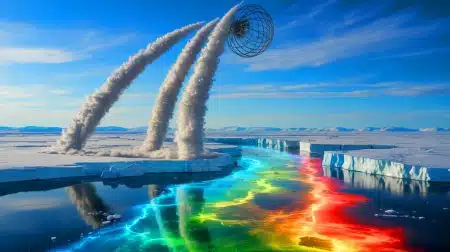| IN A NUTSHELL |
|
In recent years, the intersection of climate science and policy has become a contentious battleground in the United States. A recent climate report released by the Department of Energy (DOE) has sparked significant controversy among scientists and policymakers alike. Critics argue that the report undermines established climate science, potentially influencing critical regulatory decisions. As the Environmental Protection Agency (EPA) reconsiders its stance on the regulation of greenhouse gases, the integrity of climate science faces unprecedented scrutiny. This debate unfolds against a backdrop of increasingly severe natural disasters attributed to climate change, raising questions about the nation’s commitment to addressing the climate crisis.
The Role of Climate Science in Policy
The importance of climate science in shaping policy cannot be overstated. For decades, scientific research has informed government actions aimed at mitigating the impacts of climate change. The DOE’s recent climate report, however, has been criticized for departing from this tradition. According to Kim Cobb, a professor at Brown University, the report attempts to “circumvent, bypass, undermine decades of the government’s own work with the nation’s top scientists.” This departure has raised alarms among experts who emphasize the need for evidence-based policymaking.
Under the Trump administration, the EPA announced plans to reconsider the 2009 endangerment finding. This finding has been crucial in allowing the agency to regulate greenhouse gases under the Clean Air Act. The DOE’s controversial report has been cited in the EPA’s proposal to rescind the finding, sparking concerns among scientists and environmentalists. The potential rollback of these regulations could have significant implications for the country’s climate strategy.
“World’s first-ever”: Denmark’s historic tax on cow farts shocks climate activists worldwide
Legal and Scientific Perspectives
The debate over the DOE report highlights a critical intersection between legal and scientific considerations. Roger Pielke Jr., a science policy analyst, argues that the push to overturn the endangerment finding is driven more by legal arguments than scientific evidence. "The endangerment finding might be in danger," Pielke notes, suggesting that the current composition of the Supreme Court could play a pivotal role.
This legal focus is concerning for many scientists who believe that sound science should underpin environmental regulations. Kim Cobb warns that undermining climate science could lead to broader consequences, affecting various aspects of science and technology. The potential legal battles underscore the complex interplay between science, policy, and the judiciary in shaping the nation's environmental future.
Impacts of Climate Change on Communities
As the debate over climate science and policy unfolds, communities across the United States continue to face the harsh realities of climate change. Natural disasters such as hurricanes, wildfires, and floods have become more frequent and severe, exacerbated by rising global temperatures. These events highlight the urgent need for effective adaptation and mitigation strategies.
Kim Cobb emphasizes that climate science is a vital tool for ensuring prosperity and safety in the face of these challenges. Turning away from scientific insights could leave communities vulnerable and ill-prepared. The federal government's approach to climate science will play a crucial role in determining how the nation responds to these growing threats. As communities grapple with the impacts, the need for robust, science-based policies becomes increasingly apparent.
The Future of Climate Policy in the U.S.
The ongoing debate over the DOE's climate report and the EPA's regulatory approach raises important questions about the future of climate policy in the U.S. As legal battles loom, the role of science in shaping policy decisions remains a point of contention. Policymakers must navigate these challenges while addressing the urgent need for climate action.
Looking ahead, the nation's approach to climate policy will likely hinge on a delicate balance between scientific integrity and legal considerations. The outcome of this debate will have far-reaching implications for the country's ability to address climate change effectively. As the world faces an uncertain climate future, the U.S. must determine its path forward in a way that prioritizes both scientific rigor and legal soundness.
In the face of these challenges, the critical question remains: How can the United States develop a climate policy that effectively balances scientific integrity with legal and political realities? The answer to this question will shape the nation's response to climate change for years to come.
Did you like it? 4.6/5 (29)







Is this report an April Fool’s joke? 🤔
Is it really possible to just ignore decades of climate research? 🤔